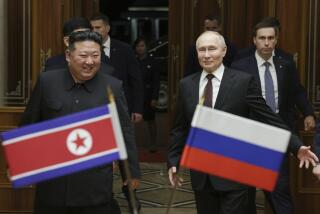First Weigh Costs of Visitig Pyongyang
- Share via
It’s one summit after another: Camp David last July; Sharm el Sheik this week; Bandar Seri Begawan and Hanoi next month. And now a possible presidential trip to Pyongyang to meet with North Korean leader Kim Jong Il. From Maryland to Egypt to Brunei to Vietnam, and perhaps North Korea too, Bill Clinton’s presidency is ending in a blaze of personal diplomacy. The slogan he rode in on eight years ago has been turned around for the ride out: It’s not the economy, stupid. It’s the world.
One can hope these efforts will succeed without being convinced that they will. To scale a summit, the climbers must be well prepared. A chance of failure need not deter them, but a lack of preparation should. Presumably that is the logic behind the trip being planned by U.S. Secretary of State Madeleine Albright to Pyongyang to explore a possible Kim-Clinton summit in North Korea later this year.
Should Clinton add Pyongyang to his itinerary? Only if the benefits in concrete cooperative actions by the North Korean regime can be expected to outweigh the costs of such a meeting. Those costs should not be ignored in the rush to embrace as something real what is in fact a still fragile, reversible chance to institutionalize peace on the Korean peninsula.
The first cost is the unavoidable legitimation of one of the world’s most repressive regimes. Photo ops and atmospherics may make Clinton’s presidency look more successful as it winds down. Less harmlessly, they will be used by Kim to demonstrate to his own people, whom his regime has isolated and abused, that he has the support of the world’s sole superpower, and a democracy at that. A Clinton trip also will be used to validate Kim’s policy of using the threat of developing nuclear weapons to extract concessions from the West. These clear gains for Pyongyang can only be justified by concrete cooperative actions on its part regarding outstanding issues. Examples could include significant steps toward nuclear and conventional demilitarization and the opening of North Korea’s autarkic economy.
A second cost involves South Korea and Japan. If Clinton does go to Pyongyang, will he also visit Seoul and Tokyo? Governments in the latter capitals may be more surprised than pleased if the president’s jet flies directly to and from the North, literally over the heads of these American allies. And such a blatant disregard for consultation will weaken a prerequisite for long-run success on the peninsula: that summit diplomacy be broadened and deepened into win-win relationships between North Korea and its neighbors.
A third cost arises from the way in which a Clinton trip could tie the hands of his successor in the White House. If a Pyongyang summit succeeds, no problem. But what if it fails? What if it was not sufficiently prepared? As the clock ticks toward Inauguration Day in January, other things being equal, any major new foreign-policy initiative on Clinton’s part becomes less appropriate.
As they seek a net balance of opportunity and danger in a presidential trip to Pyongyang, Clinton’s advisors might consider this alternative:
One of the summits on Clinton’s schedule will occur Nov. 15-16 in Bandar Seri Begawan, the capital of Brunei in Southeast Asia. On that occasion the heads of the nearly two dozen economies in the Asia Pacific Economic Cooperation forum will hold their annual gathering. North Korea is not a member of APEC. However, the South Korean president, Nobel Peace Prize-winning Kim Dae Jung, could invite Kim Jong Il to the meeting as an observer or as his personal guest. That would allow Clinton to meet Kim Jong Il outside of North Korea at an event meant to promote economic openness and growth across the Pacific Rim.
Such a lower-risk venue would not showcase the North Korean dictator’s prowess in hosting the president of the United States. It would emphasize instead the need for North Korea to seek, proactively, cooperative relationships with other countries for the tangible benefit of the region.
More to Read
Sign up for Essential California
The most important California stories and recommendations in your inbox every morning.
You may occasionally receive promotional content from the Los Angeles Times.













